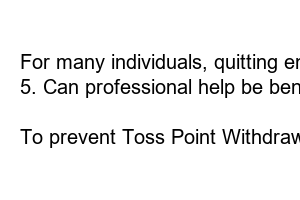토스 포인트 출금
Title: Dealing with Toss Point Withdrawal: A Guide to Overcoming Digital Addiction
Introduction:
In today’s fast-paced digital world, the addictive nature of technology has become all too real for many individuals. One such phenomenon is Toss Point Withdrawal, which refers to the sense of distress or anxiety experienced when someone is unable to access or use their favorite social media or gaming platform, Toss Point. In this blog post, we will discuss the symptoms of Toss Point Withdrawal, its potential consequences, and effective strategies to overcome this addiction.
1. Understanding Toss Point Withdrawal:
Toss Point Withdrawal is characterized by irritability, restlessness, anxiety, or depression when not being able to engage with the Toss Point platform. This can lead to a strong desire to return to the platform for a sense of relief.
2. Signs and Symptoms:
Frequent thoughts about Toss Point, constant checking of notifications, neglecting responsibilities or relationships, and experiencing withdrawal symptoms when not using the platform are common indicators of Toss Point Withdrawal. Individuals may also feel a sense of fear of missing out (FOMO) or low self-esteem due to unrealistic social comparisons.
3. Impact on Mental Health:
Excessive use of Toss Point can affect mental well-being. Studies have found links between social media addiction and symptoms of anxiety, depression, sleep disturbances, and low self-esteem. It is crucial to recognize the negative impact it can have on mental health.
4. Coping Strategies:
a. Setting Boundaries: Establish specific time limits for using Toss Point and stick to them.
b. Engaging in Offline Activities: Discover new hobbies, spend time with loved ones, or engage in physical exercise to shift focus away from Toss Point.
c. Practicing Mindfulness: Cultivate mindfulness techniques to become more aware of your thoughts and emotions, allowing you to better control impulses to use Toss Point excessively.
d. Seeking Support: Talk to a trusted friend or family member about your struggle with Toss Point Withdrawal, or consider seeking professional help if necessary.
5. Gradual Digital Detox:
Reducing Toss Point usage gradually rather than abruptly quitting may be more effective for some individuals. Gradually replacing screen time with offline activities can help regain control and manage withdrawal symptoms more effectively.
6. Tips for a Healthy Relationship with Toss Point:
a. Define Your Purpose: Set clear intentions for your Toss Point usage, focusing on meaningful interactions and information.
b. Curate Your Feed: Ensure your Toss Point feed consists of positive and uplifting content that aligns with your interests and values.
c. Unfollow Negative Influences: Eliminate accounts that trigger negative emotions or have a detrimental impact on your mental health.
d. Focus on Real Connections: Prioritize building and nurturing offline relationships, which offer more meaningful and fulfilling experiences.
Summary:
Toss Point Withdrawal can significantly impact mental health and overall well-being. It is imperative to recognize the signs, symptoms, and consequences of this addiction. By implementing coping strategies, practicing a gradual detox, and fostering a healthier relationship with Toss Point, individuals can regain control and lead a more balanced and fulfilling life.
FAQs:
1. Can Toss Point Withdrawal be considered a real addiction?
Yes, Toss Point Withdrawal can be classified as a behavioral addiction, just like other forms of digital addiction.
2. How long does it take to overcome Toss Point Withdrawal?
The duration varies for each individual, but with a combination of self-discipline, support, and persistence, one can gradually overcome Toss Point Withdrawal.
3. Will I miss out on important events if I reduce my Toss Point usage?
FOMO is a common concern, but by setting boundaries and engaging in offline activities, you can lead a fulfilling life without missing out on significant events.
4. Is it necessary to completely quit using Toss Point?
For many individuals, quitting entirely may not be necessary. Establishing a healthy relationship with Toss Point is the key, with defined boundaries and a purposeful approach to its usage.
5. Can professional help be beneficial in overcoming Toss Point Withdrawal?
Absolutely. Seeking help from therapists or addiction counselors who specialize in digital addiction can provide guidance, support, and personalized strategies to overcome Toss Point Withdrawal.
6. How can I prevent Toss Point Withdrawal in the first place?
To prevent Toss Point Withdrawal, it is important to monitor your Toss Point usage, set boundaries from the start, and prioritize offline activities and relationships.

